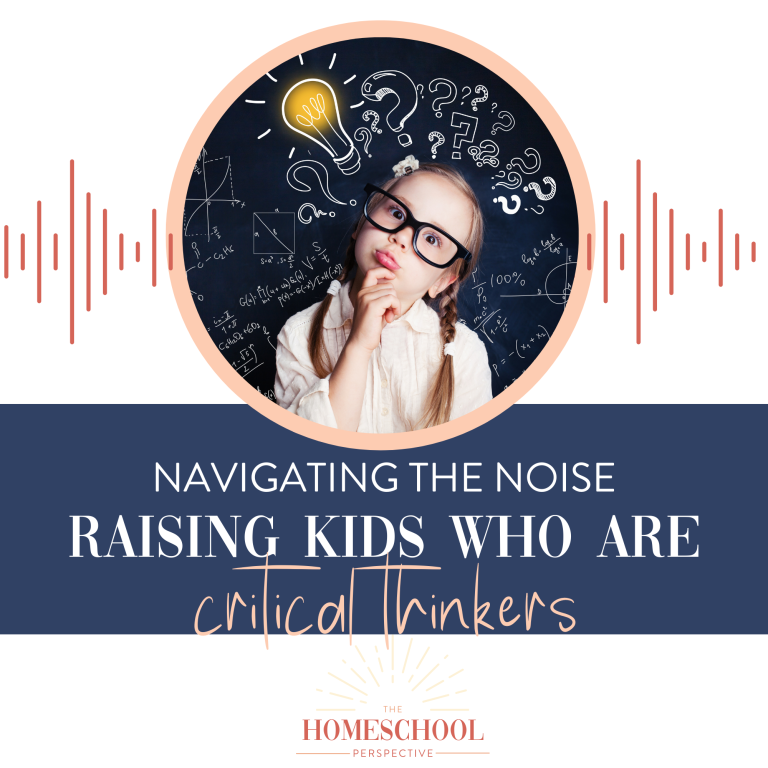Reflecting on What Worked (& What Didn’t): Part 1
With a blend of humor, wisdom, and practical advice, we explore the nuances of homeschooling, the ups, the downs, and the beautiful moments in between.
Join us as we tackle school-year transitions, reflect on positive experiences, and share strategies for maintaining balance and joy within your homeschooling environment.
Here’s a preview of what you can expect (but we promise: it’s so much more fun to listen in!)
Creating a Calming Corner: Hits and Misses
- Why We Tried It: The idea was to have a serene space where kids could retreat, calm down, and refocus.
- The Reality Check: Sometimes, our best-laid plans don’t go as expected. One host shared how her child tore down their calming corner, highlighting that not every strategy will work for every child.
Embracing the Positives
- Sibling Interaction: Witnessing the interaction and collaboration between children of different ages is one of the delights of homeschooling. It’s not just about academic learning but also about fostering strong familial bonds.
- Inclusion: Successfully including all school-age children in the learning process can be challenging yet immensely rewarding.
Balancing Homeschooling and Family Life
- Guilt and Grace: It’s okay for homeschooling to take a back seat sometimes. Lean into these periods, allowing children to explore self-led learning.
- Seasonal Reflection: Reflecting at the end of the school year or after significant breaks to assess what worked and what didn’t, without getting bogged down by guilt, is crucial for maintaining a healthy balance.
End-of-Year Planning and Reflection
- Different Approaches: Whether it’s maintaining a modified schedule over the summer or taking a more extended winter break, different families find success with various strategies.
- Finishing Early: Some families find joy and satisfaction in completing their curriculum early, often driven by interest-based learning.
- Formal Reflections: Taking stock of accomplishments and planning for the future during the transition period helps set a positive tone for the next stage of learning.
Adventures and Spontaneity
- Planning Adventures: Incorporating family adventures into the schedule by asking each member to choose a few activities ensures that each person looks forward to something exciting.
- Spontaneous Moments: Embracing unplanned, small moments with your kids can create lasting memories and enrich the homeschooling experience.
Focusing on the Positive
- Visual Highlights: Creating a visual record of the year’s highlights using photos or a whiteboard can be a powerful method to reflect on the positives.
- Daily Gratitude: Regularly sharing daily highlights as a family helps cultivate an attitude of gratitude and appreciation.
Adjusting Homeschooling Approaches
- Natural Learning: Allowing children to learn and develop at their own pace, focusing equally on character and academic growth, can lead to a harmonious learning environment.
- Adapting Systems: Reflect on what works for your family and make necessary adjustments. Whether it’s monthly family meetings or quarterly planning, pick what feels right and stick with it.
Avoiding Information Overload
- Selective Exposure: Achieving peace by limiting exposure to overwhelming advice from homeschooling influencers and social media can be beneficial. Focus on voices that align with your goals and values.
Organizational Styles and Family Rituals
- Embrace Chaos or Order: Whether you thrive in organized systems or find comfort in chaos, embracing your natural inclination is key.
- Family Rituals: Simple rituals like sharing daily highlights can strengthen family bonds and reinforce positive experiences.
Our Planning and Reflection Methods
- Quarterly Adaptations: Regularly reviewing and adjusting your plans can keep your homeschooling dynamic and responsive to your children’s needs.
- Spontaneity: Some families thrive on spontaneity, planning based on immediate needs and interests rather than rigid schedules.
Homeschooling is a journey full of unique challenges and incredible rewards. By reflecting on your experiences, embracing spontaneity, and maintaining flexible, positive systems, you can foster a joyful and effective homeschooling environment.
Don’t forget to subscribe to The Homeschool Perspective podcast and connect with us on Instagram for more resources and ongoing discussions.






